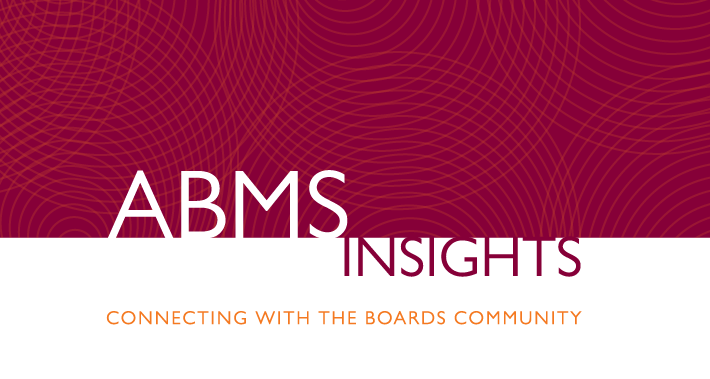
Residents spend a significant amount of time caring for patients. Thanks to the American Board of Medical Specialties’ (ABMS) progressive Policy on Parental, Caregiver and Family Leave, they can now take time to care for their new or growing family, a sick family member, and even themselves.

It’s been nearly three years since ABMS called on its 24 Member Boards with training programs of two or more years duration to allow for a minimum of six weeks away once during training for purposes of parental, caregiver, and medical leave, without exhausting vacation or sick leave, or extending training. (See How the ABMS Leave Policy Came About.)
While many boards were already compliant with the new policy, more than half updated their policies to allow for additional time to further extend leave, thus exceeding the six weeks required by ABMS.
The American Boards of Allergy and Immunology, Emergency Medicine, Medical Genetics and Genomics, Otolaryngology – Head and Neck Surgery, and Radiology, all allow for an extra two weeks away from training. “We wanted to create a policy that offers flexibility in a manner that breaks down barriers to meeting the diverse needs of all fellows in training for parental and caregiver leave,” noted American Board of Allergy and Immunology President Michael R. Nelson, MD, PhD.
While the American Board of Physical Medicine and Rehabilitation allows for an additional four weeks, the American Board of Plastic Surgery (ABPS) allows for an additional six weeks. “ABPS considered the possibility that over the course of a six-year residency, a single resident could actually require two extended leaves of absence,” said ABPS Executive Director Keith E. Brandt, MD. “This led to the more generous 12 weeks of leave versus the ABMS recommendation of six.”
Similarly, the American Board of Neurological Surgery and American Board of Thoracic Surgery (ABTS) allow for up to 12 weeks to be taken any time during training. Prior to 2022, ABTS allowed two six-week leaves, one in the first three years of training and one in the second three years. The American Boards of Medical Genetics and Genomics, Radiology, and Urology allow trainees to average leave over the duration of a residency to provide even greater flexibility.
The American Board of Pediatrics (ABP) had a longstanding leave policy allowing one month of leave per year for all trainees, and permitting up to eight weeks of additional training time to be waived due to parental or medical leave for trainees in three-year programs. In July 2021, ABP extended its policy to include all combined training programs and non-standard training pathways that are two years or more. Waivers of six or eight weeks may be granted, depending on the training pathway. The policy also enables program directors to waive time, providing all requirements are met, without having to seek ABP’s approval.
The American Board of Surgery (ABS) continues to improve upon its leave policy for residents and fellows, alike. “ABS already met ABMS standards, but we were challenged to really think about the needs of trainees and concluded not only do they need time for life events but need additional time for the ongoing permanent changes of a family,” stated Jo Buyske, MD, ABS President and Chief Executive Officer. “Our policies allow extra time off to create time and space for dealing with parenthood,” she added. In October 2021, ABS announced that residents may take two additional weeks, for a total of up to eight weeks, to cover all family events, including grieving the loss of a family member. In July 2022, ABS extended its leave policy for fellowship-based training. Surgical trainees can take leave twice during their training without having to extend it. Dr. Buyske noted that ABS is implementing competency-based assessment on July 1, 2023, which will de-emphasize time-based leave and instead rely on achievement of competencies.
The American Board of Family Medicine (ABFM) probably made the most significant changes to its leave policy of all the Member Boards, going from one of the most restrictive to one of the most family-friendly policies. As of July 1, 2020, ABFM allows up to 12 weeks away from residency in a given academic year, consisting of eight weeks of family leave with the option to take up to four weeks of vacation or sick leave, and up to 20 weeks total over three years of training without extending training.
ABFM also expanded the definition of family leave to include parental leave (birth and non-birth parents), personal medical leave requiring longer treatment, and serious illness of a family member. “These more family-friendly policies better support resident well-being and optimize early childhood development for the children of resident trainees,” noted ABFM President and Chief Executive Officer Warren Newton, MD, MPH. Previously, ABFM allowed a four-week leave policy and did not distinguish parental or family leave from other types of leave, such as vacation and sick time.
Although the American Board of Internal Medicine’s (ABIM) leave policy already exceeded ABMS’ recommendation, there had been confusion about the interpretation and application of it. ABIM allows for 10 weeks away for a one-year fellowship, 15 weeks for a two-year fellowship, and 20 weeks for a three-year residency/fellowship. After identifying the confusion as part of a joint study with the Association of Program Directors in Internal Medicine, ABIM published the results and revised the policy language to make it more clear and easy to understand.
Many Member Boards worked with stakeholders to develop their updated policies. The American Board of Emergency Medicine collaborated with emergency medicine resident organizations for nearly two years to create its policy that allows up to eight weeks of leave. The American Board of Radiology’s policy was created with extensive input from candidates, program directors, and representatives from numerous professional associations and specialty societies during a year-long process. The American Board of Obstetrics and Gynecology solicited input from residency and fellowship graduates as well as program directors to allow up to 12 weeks of leave for both residents and fellows. ABTS changed its policy following feedback from residents. In 2019, the American Board of Anesthesiology reviewed feedback from nearly 2,000 residents, program directors, program coordinators, department chairs, and diplomates before approving its policy, allowing up to 12 weeks of leave during a resident’s three years of clinical anesthesia training.
Overall, Member Boards have received positive feedback from trainees and program directors about their respective leave policies, which offer residents and fellows more flexibility in making life decisions, especially regarding family and parental leave.
| Lactation Policies Aid Nursing Mothers Taking Exams More than half of the ABMS Member Boards have lactation policies or accommodations for nursing mothers taking their board examinations. |
Read the latest issue of ABMS Insights and sign up to receive quarterly updates about board certification.
-
Read More:
- ABMS Insights |
